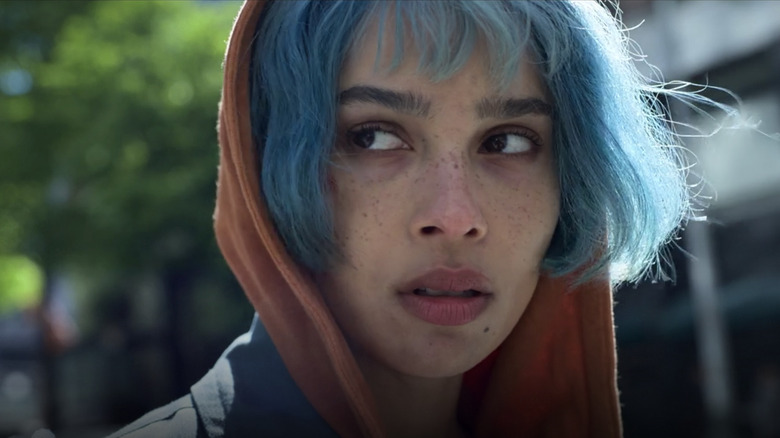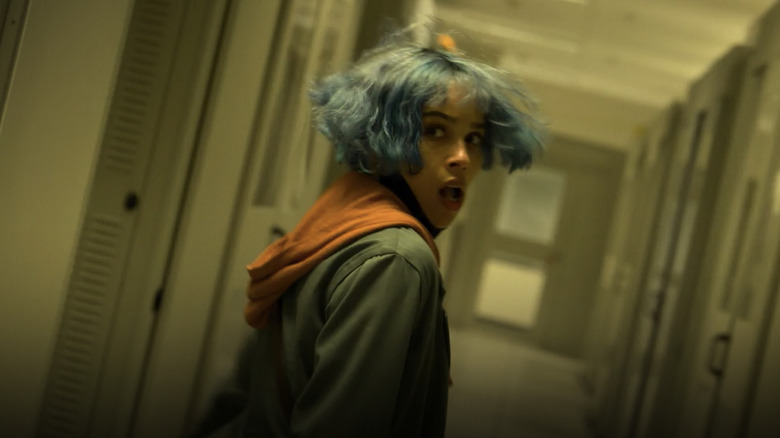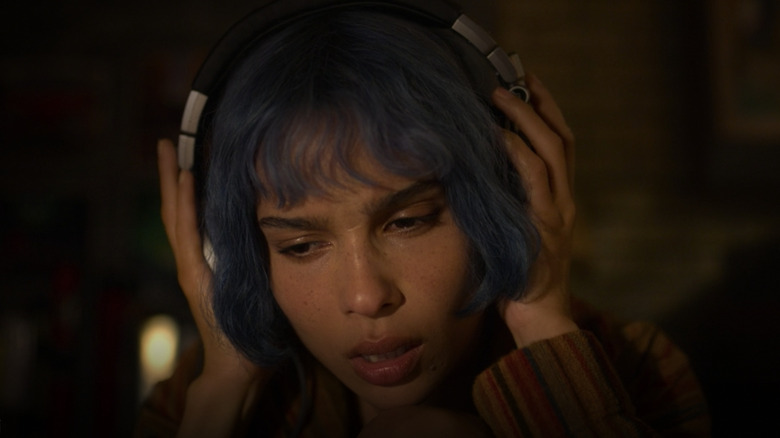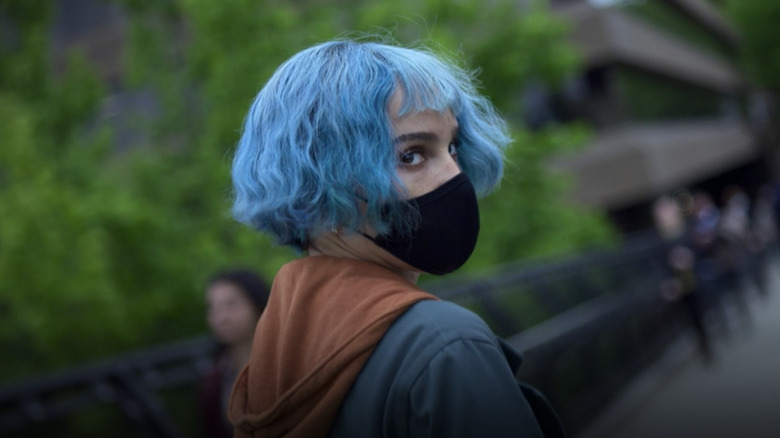Kimi Ending Explained: Can You Hear Me Now?
Steven Soderbergh has, once again, dropped another gripping, terrific film on a streaming service. His seventh film after his so-called retirement, the paranoid surveillance thriller "Kimi" sees the director/cinematographer/editor once again grabbing ahold of a traditional genre piece and transforming it into a thoughtful, stylish picture, never losing the inherent pulpiness of the material. Soderbergh does this time and time again, going all the way back to 1998's incredibly sexy crime romance "Out of Sight." With his full embrace of streaming (his last five movies all have gone straight to streaming services), Soderbergh can really be given the freedom to indulge in those genre tendencies without spending a lot of money on them.
"Kimi" feels like a throwback to a previous era of film, be it Francis Ford Coppola's "The Conversation" or Brian De Palma's "Blow Out," but it is unequivocally a picture for today. Soderbergh's latest grapples with the ever present devices around us, listening to every word we have to say. At least, that's what it is most obviously dealing with, considering the titular character is an Alexa-style speaker. But Soderbergh always has a little more on his mind. "No Sudden Move" isn't just a twisty crime movie but a treatise about the history of car company corruption in allowing pollution for profit. "High Flying Bird" may be a corporate caper movie, but it is all about the exploitation of Black athletes in a capitalist society. While one would assume "Kimi" would be a diatribe about how we have no privacy anymore, Soderbergh and screenwriter David Koepp would rather place their focus elsewhere.
For the Powerful, Silence Is Golden
Zoë Kravtiz's Angela Childs works as a voice command screener for the hilariously named Amygdala Corporation (the amygdala is the part of the brain that processes fear), the makers of Kimi. She goes through voice logs of random Kimi users to identify phrases and words the machine has not learned yet in order to improve the service. One log she hears greatly disturbs her, as it is most certainly the audio of a woman being assaulted by a man. Naturally, she wants to report this and get the FBI involved. The trouble is: not only does the company prefer to stay out of legal troubles in general, but the man committing the assault just so happens to be Amygdala CEO Bradley Hastings (everyone's favorite sad magician Derek DelGaudio).
Like every great paranoia thriller, the people you should be able to report to are the ones trying to silence you. The powers that be are not concerned with how the world should be but rather, how the world should work for them. After all, they have the money and influence. As long as you have those things, you should be able to get away with anything, ever murder. Also, Amygdala is about to be a publicly traded company as well. Hearing that its CEO assaulted (and as we later learn, ordered the murder of) someone would probably make those stock prices fall.
Where this rings as enormously true comes from how it parallels Angela's experience. She is a survivor of sexual assault, in a case where she was put on trial instead of the man. Since this, she has been unable to leave her apartment, having a panic attack anytime she tries to put her key into the door lock. Her fears aren't helped any by the fact that "Kimi" actually takes place in our actual, Covid-riddled world. Once she has these audio files and thinks she has found someone within the company to help her with the situation (Rita Wilson), she is abandoned and left running from two men tasked with eliminating her. While put in genre film terms, this is exactly the reason why so few women actually report assault and harassment, be it in the workplace or just in life. The hammer will more than likely fall down on them, not the perpetrators.
This silencing is the same driving force behind "No Sudden Move." For that film, it was the willful silencing of science about pollution and climate change to increases profits. Here, it is about the silencing of women at the expense of a safer world ... to increase profits. Because the wealthy want to get a little wealthier, a woman can't leave her home without the fear of what could happen to her.
The Contradictions of Recording
We live in a world where nearly every single second of our lives are being observed. Our computers, phones, tablets, speakers, and watches are all keeping tabs on us at all times, listening to what we say, tracking our locations, and sometimes even looking at us. Total privacy is basically unachievable in this day and age, even though all of us should have the right to it. I know I am always weirded out when something I had a conversation about with someone shows up as an ad on Instagram a few hours later. Then, there's all the stuff we record on a daily basis. Social media is flooded with photos and videos taken to document parts of our own lives to willingly put out in public. It would be easy for a filmmaker to make a movie that is a polemic about the terrors of technology, and many have done just that. "Kimi" is not as one-sided as you would assume.
The technology in "Kimi" actually is quite helpful. The woman who is murdered actively turns on her device to record the encounter in case anything happens to her, and because that recording falls to Zoë Kravtiz's Angela, eventually the murderer is brought to justice. Without the technology, there's a good chance this would just be an unsolved case with that CEO walking the Earth free. In the film's climax, Angela is able to manipulate the lights and music in her apartment to distract and escape the three men holding her and her bleeding neighbor (Devin Ratray) at gunpoint. Kimi actually helps save her life.
What "Kimi" gets right about technology is that, at their core, they are tools. Like any other tool, how one uses it determines its worth. A hammer used on a nail for a picture frame is good. A hammer used to bash in someone's skull is bad. The same goes for technology. If one of these smart speakers is used to play someone's favorite song or remind them of a meeting, it's actually an immensely valuable thing to have. But those who use it to spy on people or collect data for money making purposes are making a mockery of the tool, actively perverting it into something evil. "Kimi" shows us our inescapable technological world and shows us the reality, good and bad, of how that technology affects our lives.
A Covid Movie Without Being a Covid Movie
A challenge for so many filmmakers in the last two years, as well as those in the future, is how they should depict Covid on screen, considering the pandemic has ruled our lives and seems to be never ending. Plenty have just decided to completely ignore it outright, which in the long run seems like a smart idea. In 50 years, will the pandemic mean anything to anybody watching movies from this time period for the first time? Some have made Covid-adjacent stories, where there's some sort of other deadly virus or apocalyptic event, and they can discuss the anxieties of the last two years indirectly. A rarer breed is a movie that just so happens to be taking place in a world with Covid. People walking around in masks, frequently using hand sanitizer, and a general anxiety about being too close to another person hangs over the air. "Kimi" is one of these movies.
No one has a big discussion about Covid or why taking these precautionary measures are important. This is just how people live now. Will the presence of all this stuff date the movie? Undoubtedly, but everything about "Kimi" is hyper specific to our current time and place in regards to technology and society's treatment of women. Our current time and space happens to also have people wearing face masks. That just comes with the territory. "Kimi" is a rare movie that acknowledges Covid, and yet, it is far less about the pandemic than so many movies that won't even use its name. Plus, we are treated to a wonderful piece of physical acting by Zoë Kravitz. After she uses hand sanitizer, she will rapidly move her hands together and apart to dry them. A detail never called attention to, but was utterly delightful each time she did it.
Steven Soderbergh shows us with "Kimi" that he has his finger on the pulse. He understands the world we live in and all of its problems, but he always manages to find a way to depict it in the most entertaining way possible. He doesn't wallow in our troubles but gives us hope to fight back against them. Also, he's just making crackerjack genre flicks that I am mad I can't go see in a theater.
"Kimi" is available to stream on HBO Max.



